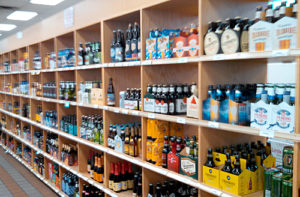The older I get, the more I find myself talking like, well, an old guy, lecturing poor young shlubs about the benefits of the old days. And I’m certain they listen intently, which is impressive given they’re usually playing Mortal Kombat on their iPhone.
In my best Grandpa Simpson, I enlighten them about what real music sounded like, which by the way had an Eric Clapton guitar solo in it, not some rap section over a dance beat. Album covers were art. Real “Star Trek” had Kirk and Spock and disposable guys in red shirts. Texting was on a post card. Sexting was on a Polaroid.
Oh, and we could drink beer before we were 21. And thus, life was awesome.
It’s time to make our final toast to 3.2 beer, that beautiful, uniquely Colorado oddity. On Jan. 1, grocery and convenience stores can sell full-octane beer, ushering the end of 3.2 brew.
For you newcomers invading our state, 3.2 referred to the alcohol limit allowed in beer sold in grocery and gas station stores. That’s 3.2 percent alcohol by volume. Unlike most other states, Colorado bans the sales of real beer, wine and spirits in any place but liquor stores. And in return, those stores are forbidden to sell most anything but booze. And, generally, liquor store owners can own only one store. This whole system is a holdover from a post-prohibition age.
Way back in the before days when you wanted baked goods, you drove to the bakery. Needed meat, back in the car to the butcher. Medicine? The pharmacy. But the market innovates, assuming special interests and competitors don’t get government to block innovation. Think of the taxi cartels using governments to stop Uber from entering in a city.
Today any King Soopers is a collection of butcher shop, bakery, florist shop, delicatessen, pharmacy, bank, fruit stand and dry goods store. Modern grocery stores disrupted (which is a tasteful term for “forced out of business”) those small mom-and-pop stores. Those few that remain survive because of their specialty items and service.
What’s the reason a grocery store, or ANY store for that matter, can’t sell real beer, booze and wine? Is there some public safety reason? If you can check an ID to see if someone is old enough to buy cigarettes, don’t you have all the skills necessary to sell liquor?
Inertia doesn’t last long in the dynamic marketplace, but inertia is the gold standard in government. So as not to put Colorado’s mom-and-pop liquor stores out of business, all other stores are banned from competing against them. Apparently, liquor store lobbyists were better than those representing the mom-and-pop bakeries, pharmacies and delis.
![]() Selling real beer in non-liquor stores is a step toward unwinding the bizarre regulatory maze of liquor sales. Another step would be liberating liquor shop owners to get as many liquor licenses as they want. A dry cleaner who wants to open a chain of his shops isn’t limited. Why the liquor store owner?
Selling real beer in non-liquor stores is a step toward unwinding the bizarre regulatory maze of liquor sales. Another step would be liberating liquor shop owners to get as many liquor licenses as they want. A dry cleaner who wants to open a chain of his shops isn’t limited. Why the liquor store owner?
But the history of 3.2 beer is more than just about protectionism. It is also about teaching kids how to drink responsibly. Until Colorado caved to the Feds, who were holding our road money hostage (thank you Mothers Against Drunk Driving), 18-year-olds could buy this watered-down beer.
Those old enough to remember phrases like, “He’s dead Jim,” will remember 3.2 bars in college and Denver night clubs like “Thirsty’s” which gave those between 18 to 21 a place to go socialize and guzzle safer beer. It was training wheels for drinking. Kids could still get drunk on 3.2 beer, though they couldn’t really drink themselves to death. But the hangover was just as real.
They became more experienced for when they were let loose at 21 to drink the dangerous stuff.
Today we push our kids off a drinking cliff. It’s little wonder why there’s so much alcohol poisoning and drug overdoses.
Just like you did, young people still like to socialize with some type of intoxicant. So now it’s underaged drinking of hard liquor and/or taking drugs in un-supervised gatherings. In the past there was at least the option of weak beer and safe, trainer bars.
With the end of 3.2 brew, so goes a connection to the age when Colorado had the freedom to govern itself and save young lives.
Jon Caldara is president of the Independence Institute, a free market think tank in Denver.


